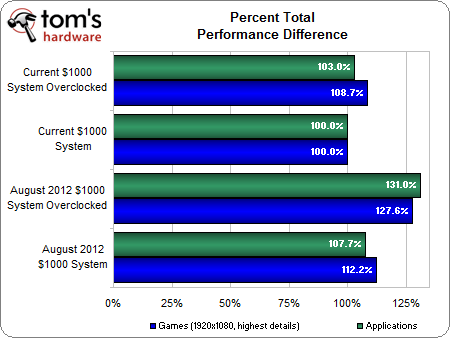System Builder Marathon, Q4 2012: $1,000 Enthusiast PC
Analyzing Our FX-8350 Experiment
Although we cannot compare the results from our entire benchmark suite (due to the addition of several tests and the modification of other workloads), we're still curious to see how the comparable numbers match up.
On average, the FX-8350 and Core i5-3570K do pretty well at their stock settings, the Intel-based box about 10% quicker. This will likely change as we fold more heavily-threaded tests into the Marathon, starting this quarter. Naturally, you'll want to look closest at the benchmarks that matter to you specifically when you evaluate performance, since each architecture excels in a different way.
When it comes to overclocking though, Intel extends its lead with significantly lower power consumption and much better performance. If we were measuring efficiency, that'd be a home run. Yes, Xigmatek's Loki is insufficient for overclocking the 125 W FX-8350. But let's be realistic. If we wanted to squeeze better performance out of AMD's chip, we'd need to spend more money on cooling, and power consumption would rise even faster as higher voltages paved the way for more aggressive clock rates. It'd be a great experiment, and we might even play around with it in the future, but it's clear that Intel's Core i5-3570K remains the better choice for overclockers in this price range.
Here's another idea: maybe the cheaper FX-8320 would make more sense matched up to a pricier (and more capable) cooler? While we consider what might have been, or what might be next quarter, prepare yourself for Thomas' $2,000 build and then the value comparison. We'll get to see how the $500, $1,000, and $2,000 systems compare when it comes to performance, power, and, well, overall value.
Current page: Analyzing Our FX-8350 Experiment
Prev Page Power And TemperatureGet Tom's Hardware's best news and in-depth reviews, straight to your inbox.
Don Woligroski was a former senior hardware editor for Tom's Hardware. He has covered a wide range of PC hardware topics, including CPUs, GPUs, system building, and emerging technologies.
-
CaptainTom So a 600w PSU for one 670? Get a 500w, get kingston RAM that is $20 cheaper, a $50-$70 liquid cooler for the FX, and BOOM! More performance for the same price. I get you wanted to test a similar system, but just make that a different article...Reply -
serhat359 Could have used a 6 or 4-core FX and made more money for a better cpu cooler and case. You have already demonstrated that more than 4 cores aren't used in gaming and here you have an 8 core CPU...Reply -
boulbox @Serhat i agree with you but this would be a better all around build. I think he could have done better thoughReply -
dkcomputer Swap mobo for ASRock Z68 PRO3 GEN3 LGA 1155 Intel Z68 and processor for a sandybridge i5-2500. No overclocking needed.Reply -
wolley74 Dat hitachi HDD, you guys do know that Seagate Barracudas are around $70 for 64MB cache 1TB storage and SATA 6 right? and arguably are far more reliableReply -
aznshinobi Why wouldn't you drop down a bit to the FX-8320, that's about $40 saved, that could save you enough money to get the 7970 which clock for clock is better than the GTX 670.Reply -
mouse24 serhat359Could have used a 6 or 4-core FX and made more money for a better cpu cooler and case. You have already demonstrated that more than 4 cores aren't used in gaming and here you have an 8 core CPU...Reply
Its not 8 core, its 4 core with dual modules per core. Shared resources. Its why you see an increase in performance between a 4300 and an 8320 -
yyk71200 mouse24Its not 8 core, its 4 core with dual modules per core. Shared resources. Its why you see an increase in performance between a 4300 and an 8320No, its other way around. It is 4 module cpu. Each module contains two integer cores (thus 8 cores total) and one FPU. It is more like reduced 8 core than full 8 core. Neverthles, Intel still is better.Reply

